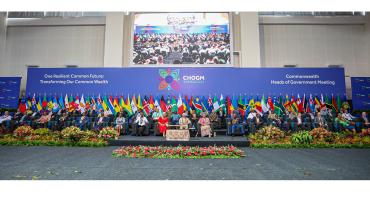Commonwealth told it has an important role to play in ensuring equal rights for persons with disabilities
Commonwealth member states were urged to hasten efforts towards ratification and improved implementation of the UN Convention on the Rights of Persons with Disabilities (CRPD) on 3 May.
The Commonwealth and partners met to raise awareness of the key principles of the CRPD and the challenges hindering persons with disabilities from full and equal participation in society, on the fourth anniversary of the Convention at Marlborough House in London, UK.
|
The majority of people with disabilities live in poverty and for many society tends to be excluding, discriminatory, at best condescending, and ultimately disabling. The UNCRPD aims to “promote, protect and ensure the full and equal enjoyment of all human rights and fundamental freedoms by all persons with disabilities, and to promote respect for their inherent dignity”. Globally 153 of the 192 UN countries have signed the Convention, of which 112 have gone on to ratify. |
To date, 28 of the 54 Commonwealth countries have ratified the Convention, which prohibits all discrimination on the basis of disability.
Commonwealth Assistant Secretary-General Steve Cutts said: “What makes the CRPD stand out is that it places on state parties for the first time, duties and obligations to ensure that persons with disabilities live a full and equal life.
“We must encourage states in the run up to the UN Rio+20 conference, the 67th UN General Assembly and the 18th Conference of Commonwealth of Education Ministers, to ratify the Convention if they have not yet done so.”
The Assistant Secretary-General said it was also important to encourage states that have ratified the Convention to look at ways of turning commitments into action.
The event was jointly organised by the Commonwealth Secretariat, the Commonwealth Foundation and the Commonwealth Disabled People's Forum. It brought together 50 participants including international development agencies and high commissions’ and civil society representatives.
More than one billion people, or one in seven of the world’s population, are estimated to live with some form of disability of whom 80 per cent live in developing countries.
Director of the Centre for Disability Law and Policy, Professor Gerard Quinn; Interim Chair of the Commonwealth Disabled People's Forum, Rachel Kachaje; CEO of UK Disabled People's Council, Jaspal Dhani; and CEO of World of Inclusion and Treasurer of the Commonwealth Disabled People's Forum, Richard Rieser, each spoke on the importance of implementation of the CRPD.
Mr Rieser said persons with disabilities were still often regarded in derogatory ways such as “bewitched, cursed, tools for begging, contagious, shameful, a burden” in many societies.
“The Secretariat has an important role in raising awareness and helping governments to put in structures to ratify and implement the Convention and to help organise capacity-building events across the Commonwealth. The Foundation also has a crucial role in supporting civil society organisations towards implementation,” he said.
|
The Commonwealth Disabled People's Forum will be collaborating with Disabled People’s International and the Australia Human Rights Commission to deliver training to six East African countries on the Convention later this month in Kampala, Uganda. Australia will be the first Commonwealth country to be reviewed by the UNCRPD Committee in 2013. |
Acting Head of Human Rights at the Secretariat Karen McKenzie said: “We envisage being a partner in fostering multi-sector responses and developing regional and national capacities to address the disability rights protection challenges.”
In January this year, the Secretariat hosted an expert roundtable to discuss inclusive education and sustainable employment for persons with disabilities.
The roundtable saw representatives of Commonwealth countries, national human rights institutions, disabled people’s organisations and non-governmental organisations review best practice examples from 12 member countries.
The Commonwealth Heads of Government Meeting 2011 Communiqué urges member states to consider becoming parties to all major international human rights instruments including the CRPD.



